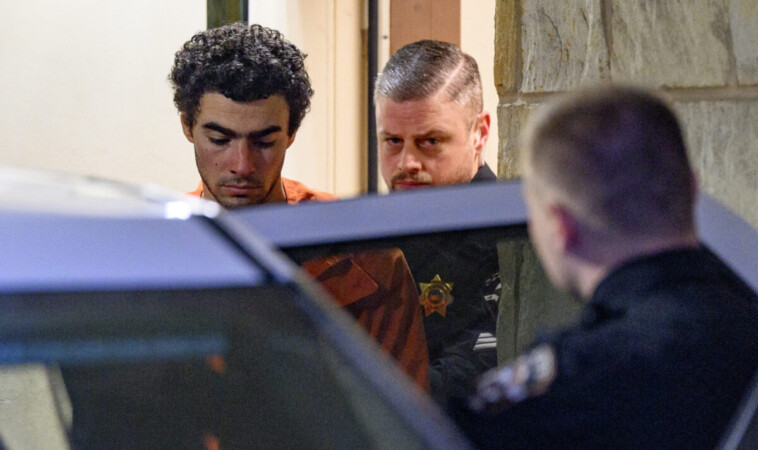Prosecutors are throwing the book at suspected UnitedHealthcare CEO assassin Luigi Mangione as a grand jury indicted him this week on terrorism charges.
Manhattan District Attorney Alvin Bragg argued that the killing of Brian Thompson on December 4 “was intended to cause shock and attention and intimidation.” Bragg announced on Tuesday that Mangione is being charged with “murder in the first degree as a killing in furtherance of terrorism” along with “two counts of murder in the second degree,” one of which accuses Mangione of killing Thompson in an “act of terrorism.”
A first-degree murder charge in New York is rare as it requires the victim to be a witness, judge, or police officer, or for the killing to be a murder-for-hire or a murder with intent to commit terrorism. The maximum sentence for first-degree murder is life in prison without parole.
“This was a frightening, well-planned, targeted murder that was intended to cause shock and attention and intimidation,” Bragg said. “It occurred at one of the most bustling parts of our city, threatening the safety of local residents and tourists alike.”
Upon his arrest in Altoona, Pennsylvania, on December 9, police allegedly found a notebook on Mangione that includes a passage where the writer mentions taking out “the CEO at the annual parasitic bean-counter convention.” Mangione also allegedly had a manifesto on him that accused UnitedHealthcare of prioritizing profit over patients. Law enforcement believes Mangione was motivated by anger with the U.S. healthcare system. Bragg claims that Mangione “intended to evoke terror” with the killing.
Prosecutors allege that Mangione “intended to intimidate or coerce a civilian population” and to “affect the conduct of a unit of government by murder,” according to The New York Times. How the murder of Thompson “affect[s] the conduct of a unit of government” wasn’t immediately clear as Thompson worked for a private healthcare company. The Daily Wire reached out to the Manhattan District Attorney’s Office for clarification on the charges.
A law passed in New York shortly after the September 11, 2001, terrorist attacks, allows prosecutors to tack on terrorism charges to certain crimes if they’re “intended to intimidate or coerce a civilian population, influence the policies of a unit of government by intimidation or coercion and affect the conduct of a unit of government by murder, assassination or kidnapping,” according to the Associated Press. The FBI uses the same definition for domestic terrorism. The New York law was first used by prosecutors in 2002 on a Bronx gang member who killed a young girl and paralyzed a rival gang member in a hail of gunfire outside a christening party. A decade later, New York’s highest court ruled that the gang member was not a terrorist, and he was retried and convicted on other charges.
Some legal experts expressed skepticism over the prosecution’s chances to convict Mangione on the terrorism charges. Anna Cominsky, director of the criminal defense clinic at New York Law School, told the Times that accusing Mangione of committing terrorism seems abnormal in this case because “this isn’t traditionally how we think of terrorism.”
CHECK OUT THE DAILY WIRE HOLIDAY GIFT GUIDE
“What they’re saying is because it was done in the location that it was done in, because of the manner in which it was done, that the aim was to terrorize, that it was to scare people. Not just to kill this individual,” Cominsky said.
Former federal prosecutor Jessica Roth told CNN’s Anderson Cooper that “by including” the terrorism charges, “the district attorney is setting up the conditions for a plea to a lesser charge where he has the possibility of, at some point, getting out of prison.”
“If there isn’t a plea, it’s also setting up the condition for a jury compromise on that lesser charge,” Roth added.


